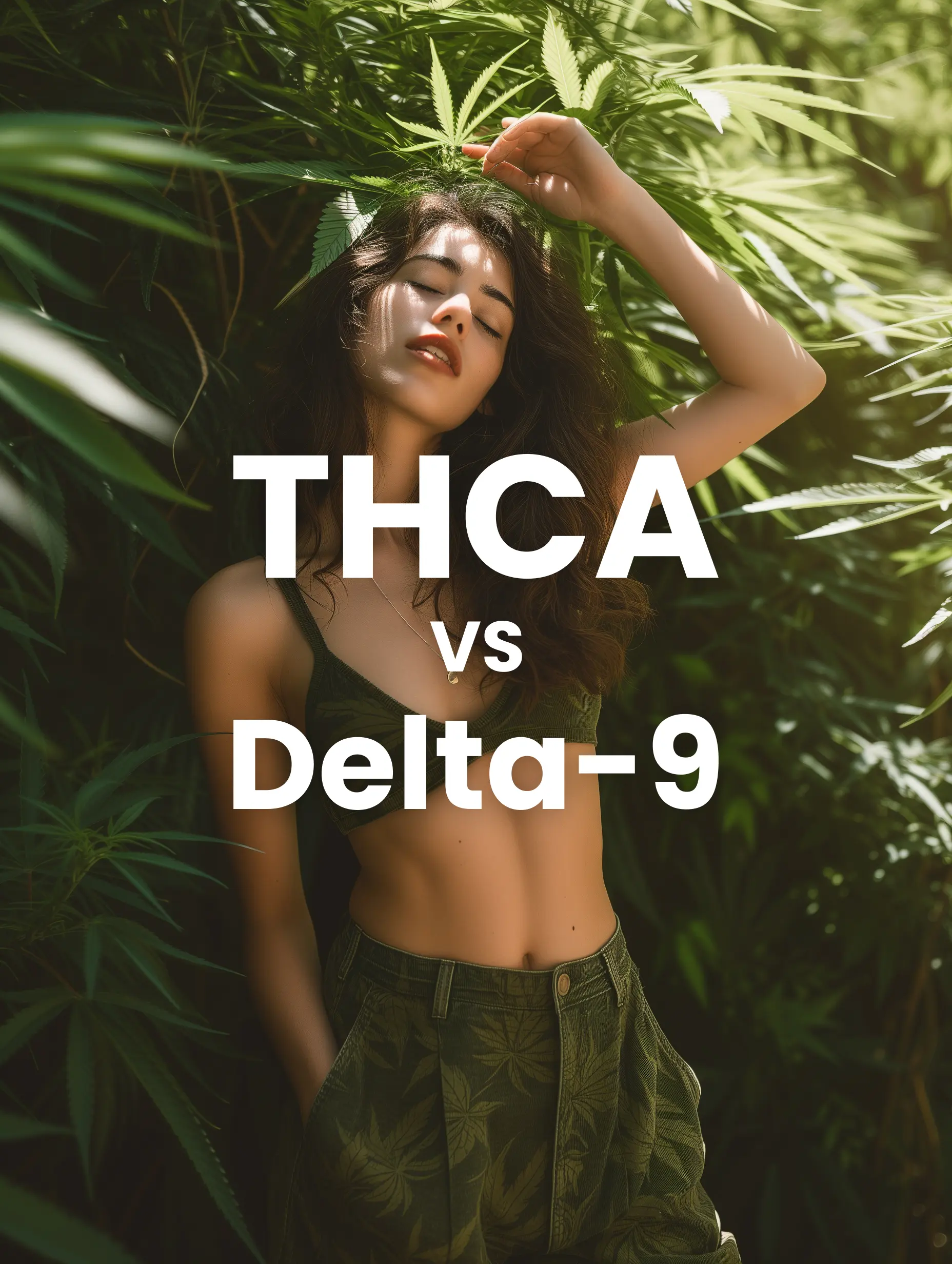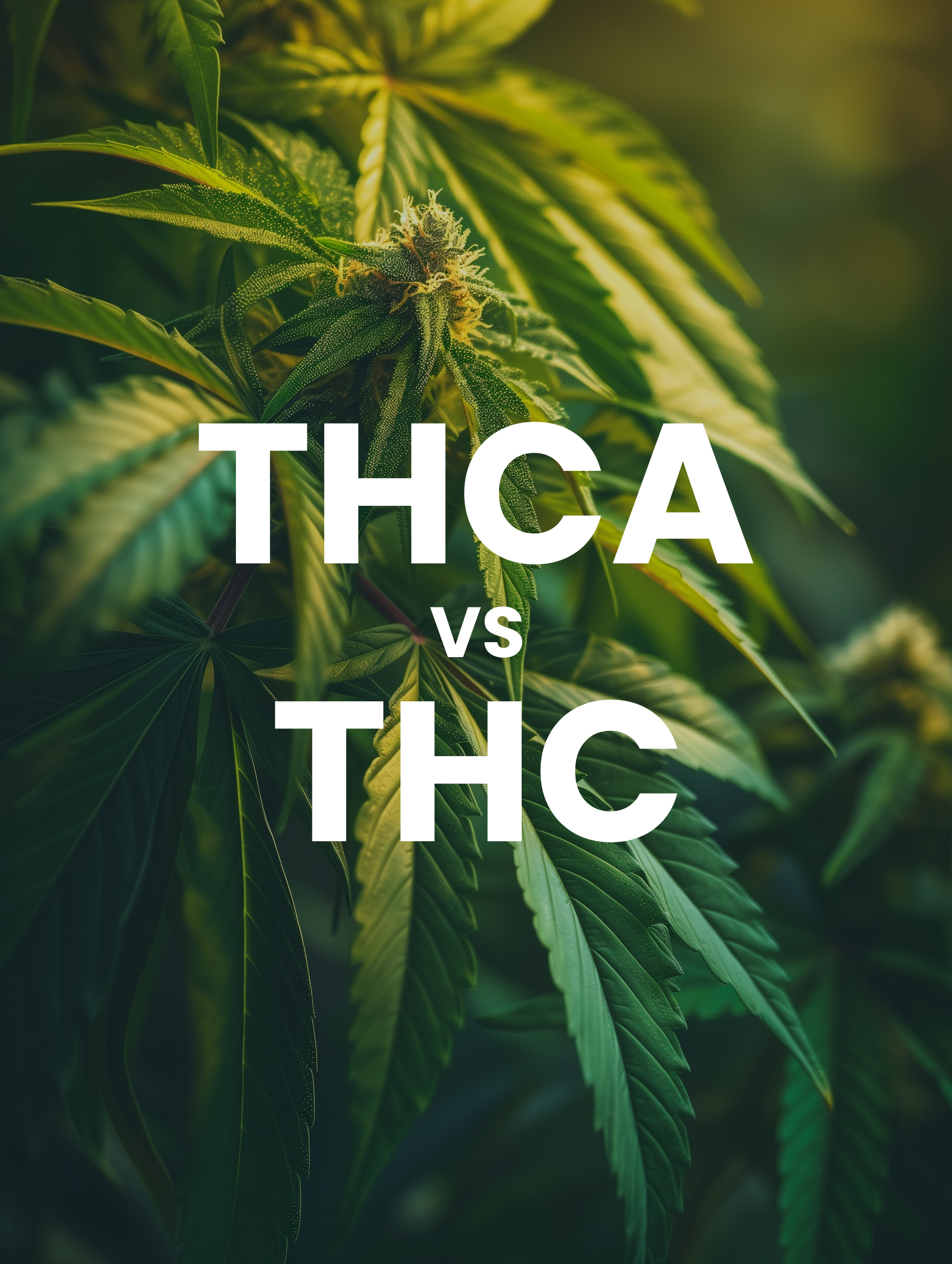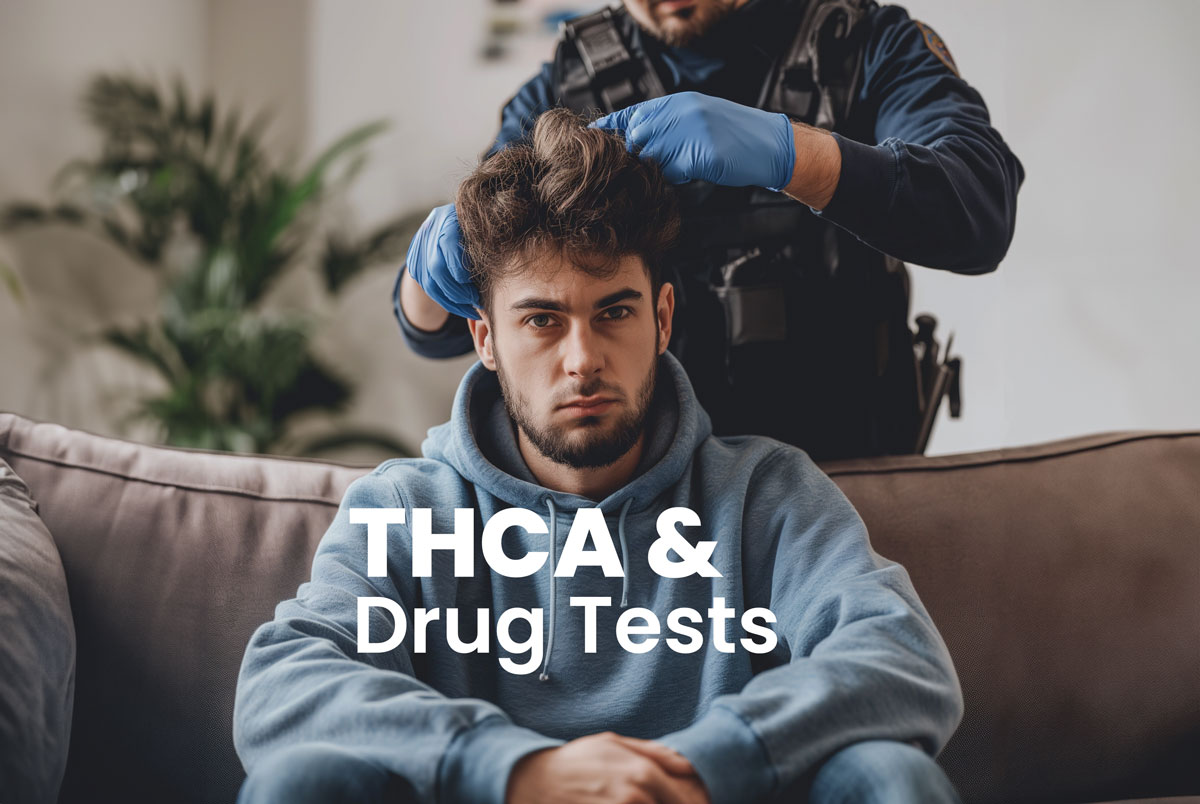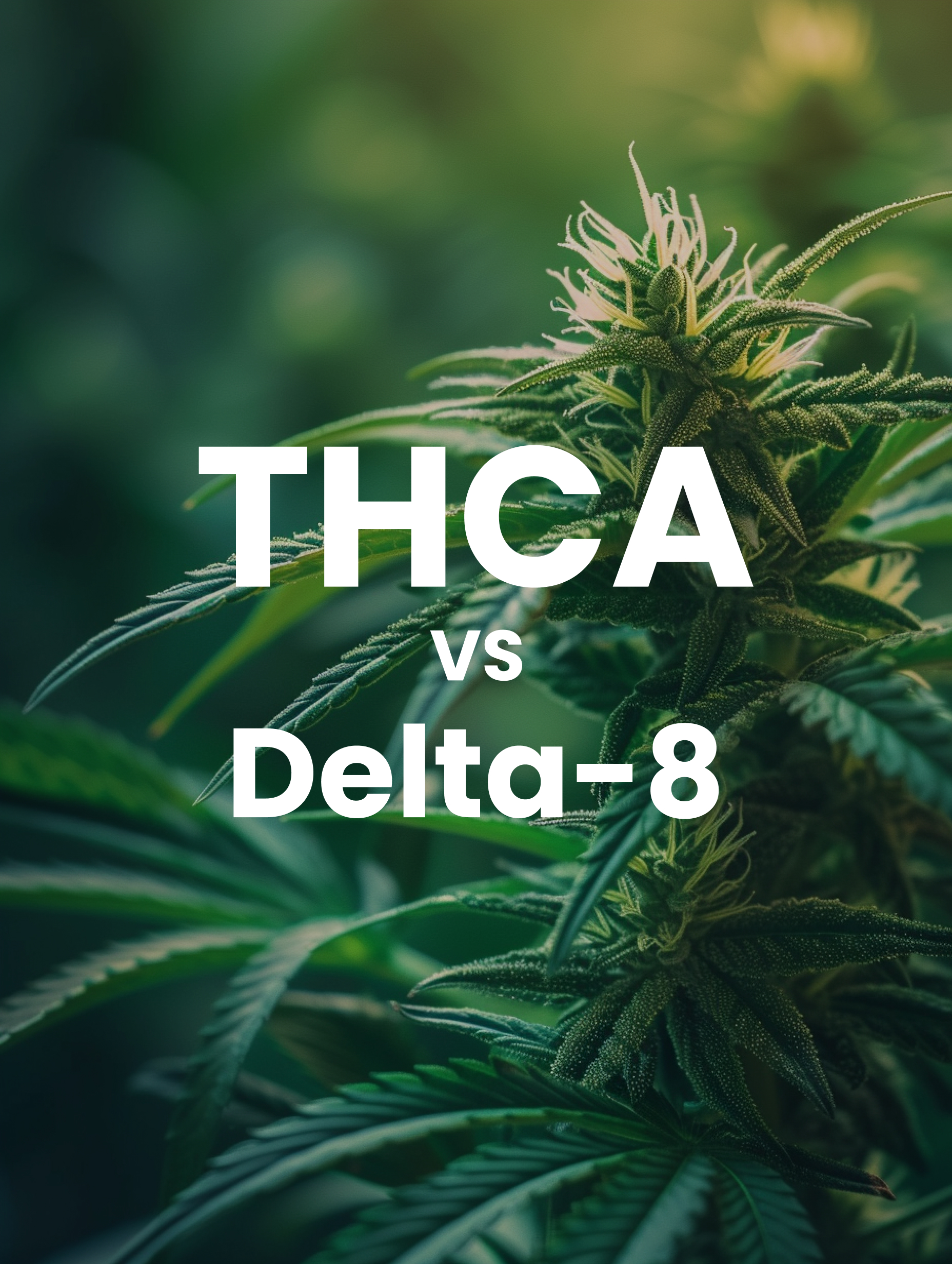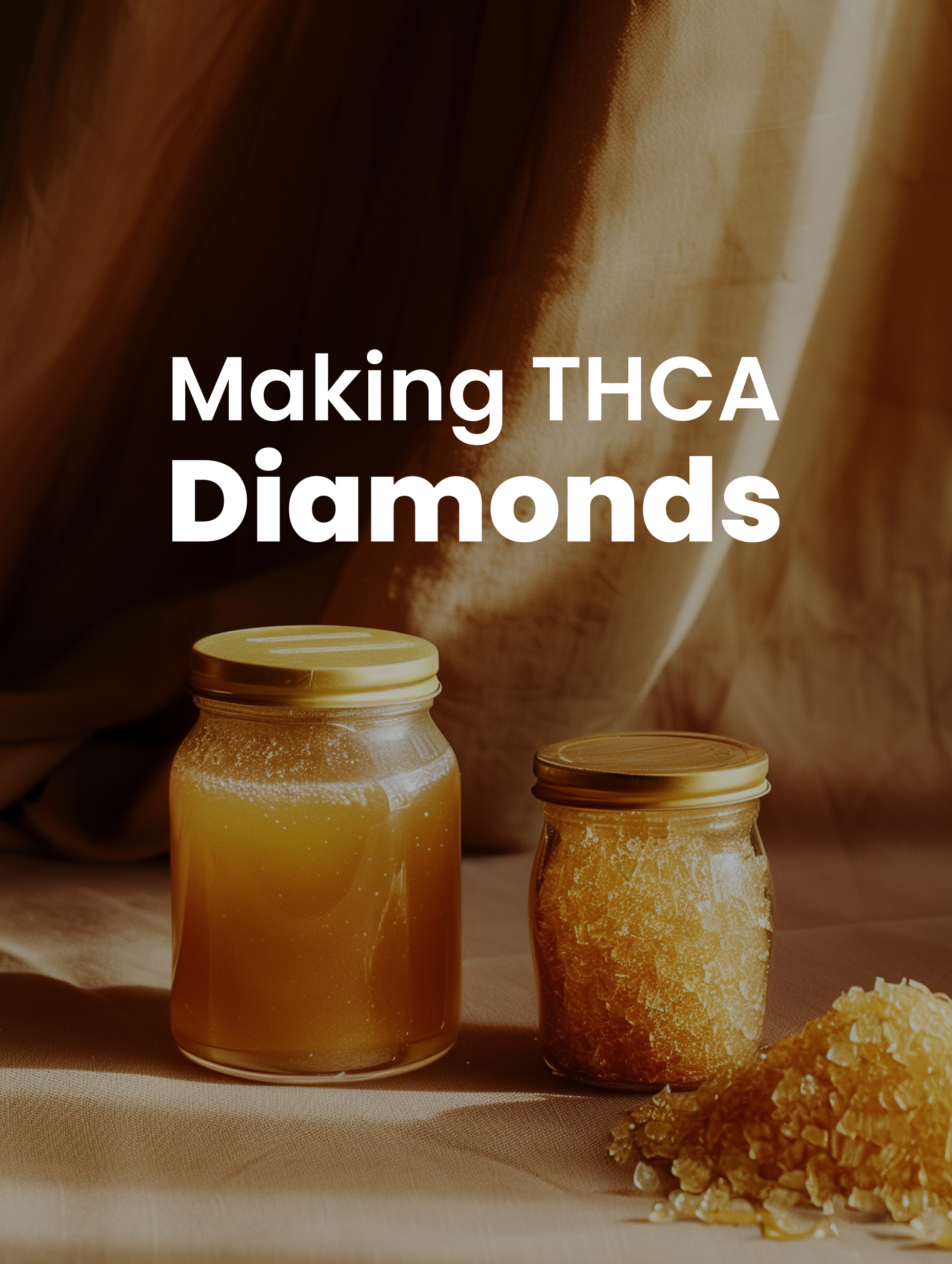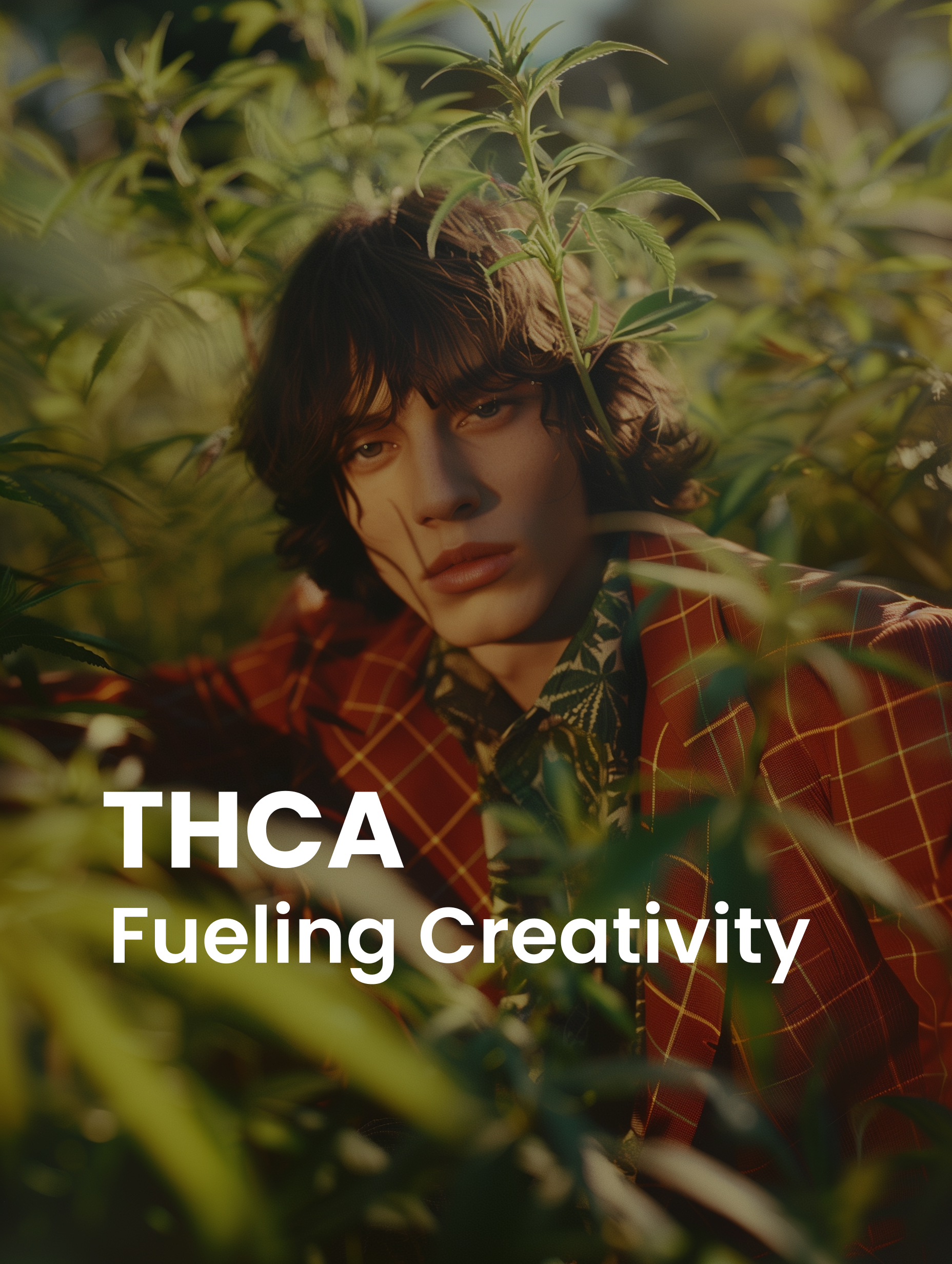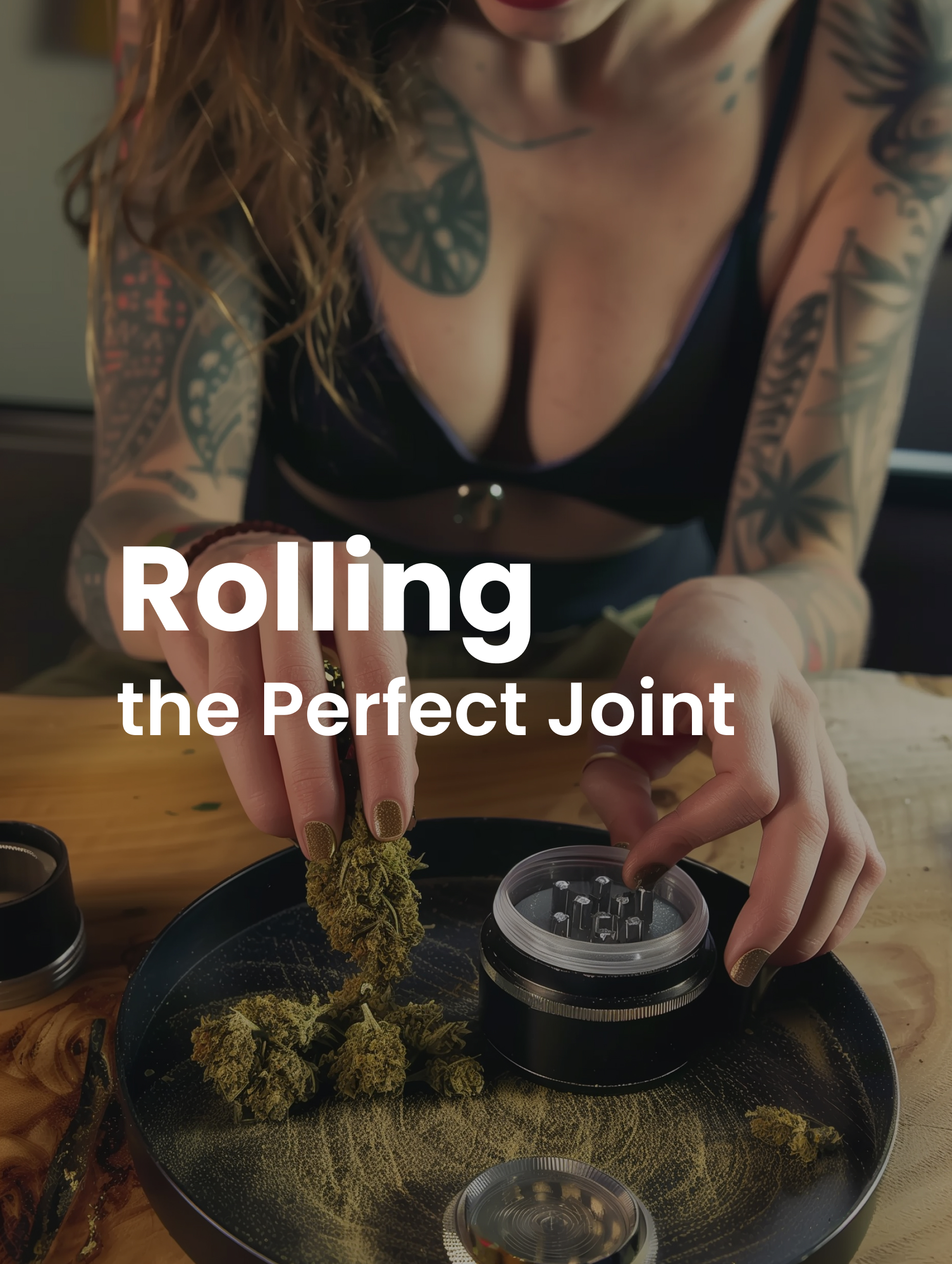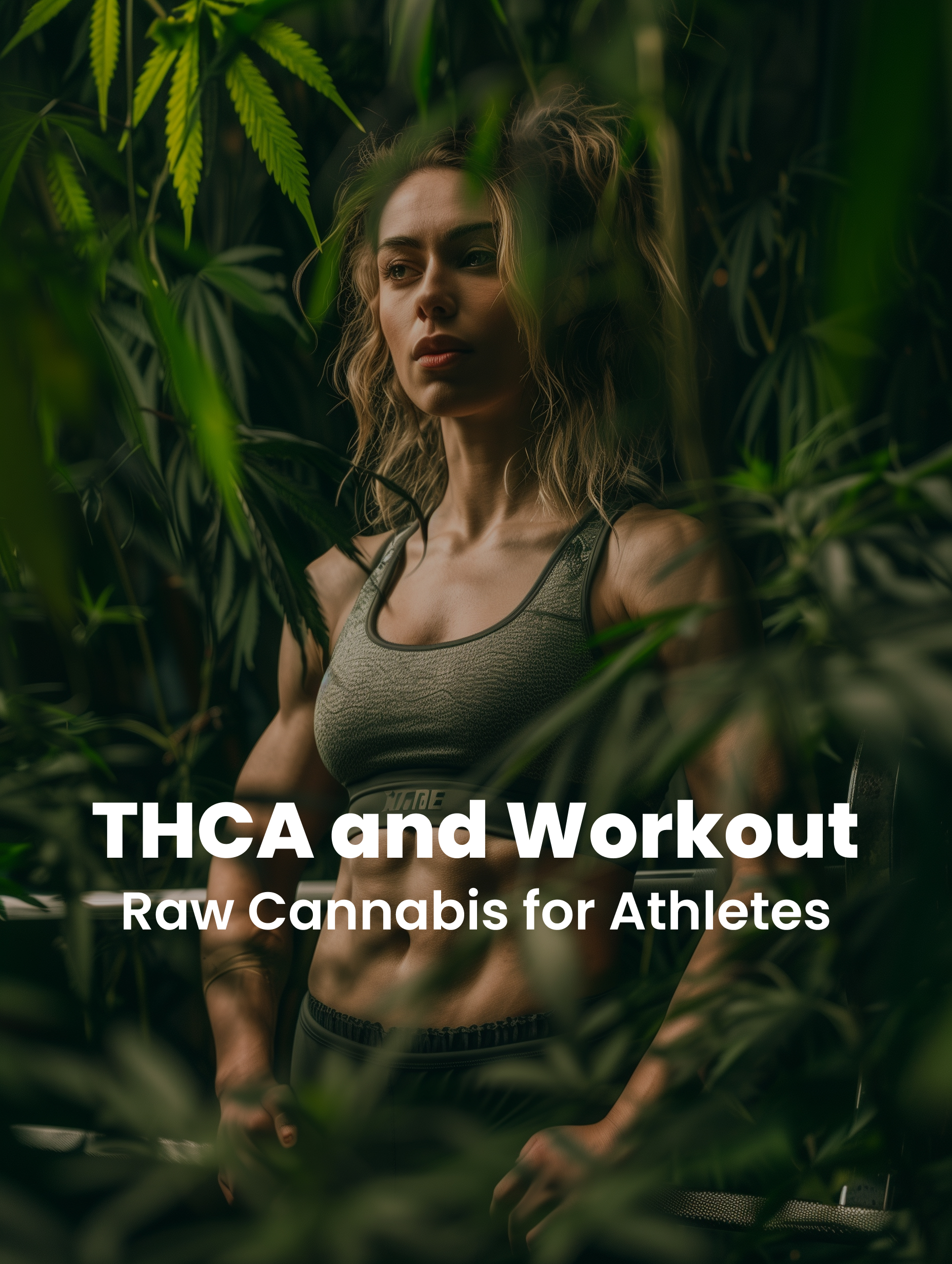Is THCA Legal in USA? State by State Guide
THCA (also THCa, THC-A, or THC A) is shaking up the hemp market as one of the latest alternative cannabinoids. What makes THCA unique is that it occurs naturally in the plant and transforms into psychoactive THC when you heat and smoke it. You can find broadly available high THCA hemp products nationwide that will get you high.
But here’s the question: is THCA legal everywhere?
In this guide, we’ll explain THCA legality in the U.S., including the current THCA legal status in each state and where you can find legal THCA for sale.

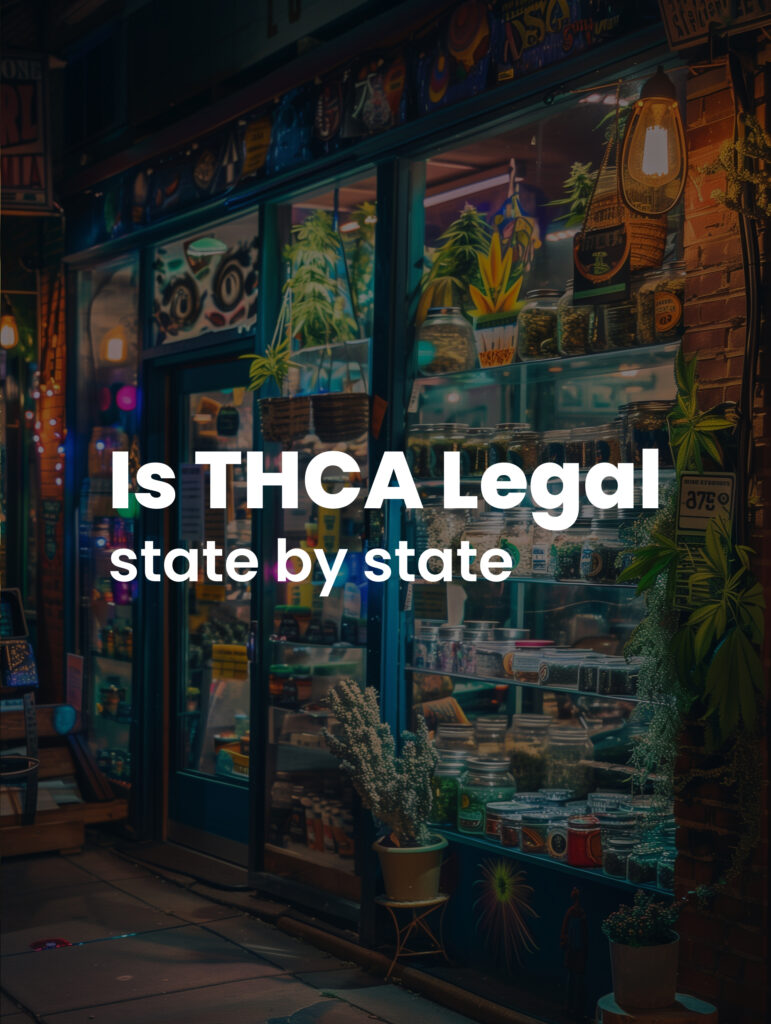
Key Takeaways
- THCA, the acidic form of THC, occurs naturally in cannabis. It won’t get you high until you heat it, which magically transforms it into the THC we all know and love.
- Want to blast off with THCA? Just grab some high THCA hemp products, like flower or vapes, and apply a little heat. Voila! You’re in for a ride similar to regular THC.
- THCA is like the rebel of the cannabis world. It’s not explicitly banned under federal law, but some states are total buzzkills with their strict testing requirements that harsh THCA’s vibe.
- The 2018 Farm Bill gave hemp products with less than 0.3% Delta-9 THC the green light, but it didn’t mention THCA. This oversight has led to a wild west of interpretations on THCA’s legality.
- Before harvest, the USDA is all about that “Total THC” life. They test hemp plants for both THC and THCA levels. But post-harvest, the DEA only cares about Delta-9 THC levels in finished products. Go figure.
- In most states that vibe with the Farm Bill’s language, THCA is totally cool. But in states with stricter “Total THC” testing for finished products, THCA is about as welcome as a skunk at a garden party.
- State laws on THCA and hemp products change faster than you can say “pass the dutchie.” If you want to stay in the know, you gotta keep your ear to the ground on your state’s current regulations.
- When in doubt, play it safe. If you’re not sure about THCA’s legality in your neck of the woods, hit up your local authorities or legal eagles for clarity.
- Just because THCA might be legal in your state doesn’t mean it won’t show up on a drug test. It can still cause some serious personal or professional drama if you’re not careful.
- As with any cannabis product, consume responsibly. Start low, go slow, and be aware of the potential risks and side effects. Oh, and always buy from legit, licensed sources. No shady deals, my friends.
So there you have it, the lowdown on THCA. Now go forth, stay informed, and enjoy responsibly. And remember, when it comes to cannabis, knowledge is power (and could keep you from getting into some seriously sticky situations).
States Navigation
- Alabama
- Alaska
- Arizona
- Arkansas
- California
- Colorado
- Connecticut
- Delaware
- Florida
- Georgia
- Hawaii
- Idaho
- Illinois
- Indiana
- Iowa
- Kansas
- Kentucky
- Louisiana
- Maine
- Maryland
- Massachusetts
- Michigan
- Minnesota
- Mississippi
- Missouri
- Montana
- Nebraska
- Nevada
- New Hampshire
- New Jersey
- New Mexico
- New York
- North Carolina
- North Dakota
- Ohio
- Oklahoma
- Oregon
- Pennsylvania
- Rhode Island
- South Carolina
- South Dakota
- Tennessee
- Texas
- Utah
- Vermont
- Virginia
- Washington
- West Virginia
- Wisconsin
- Wyoming
THC vs. THCA
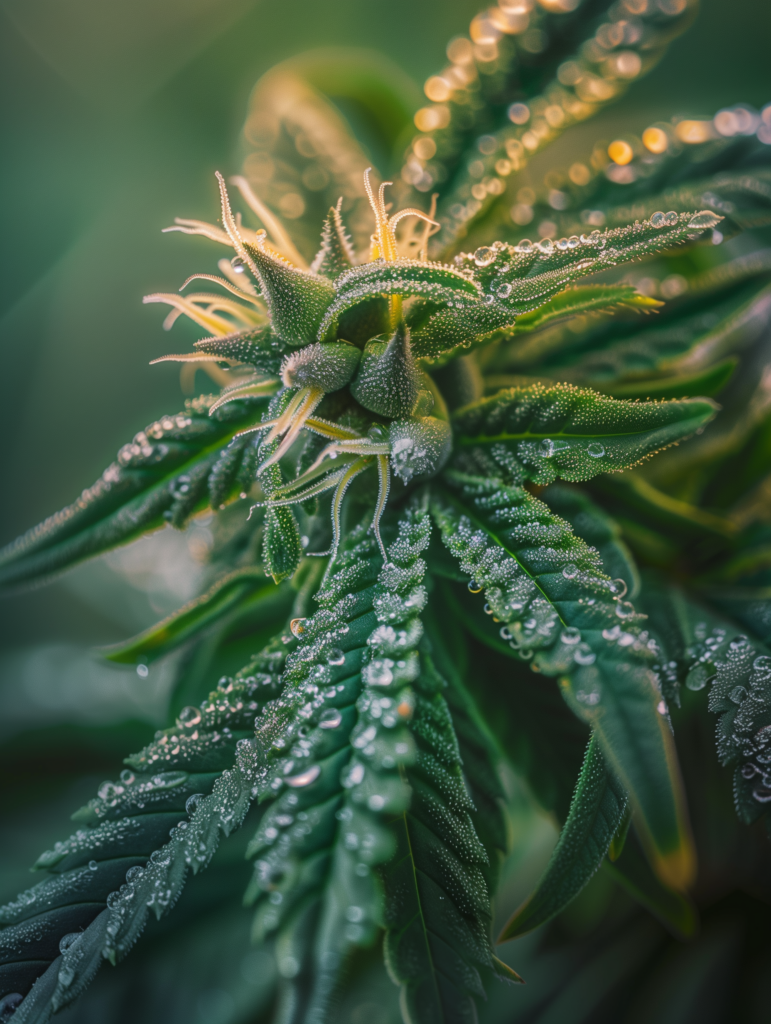
You’re probably familiar with Delta-9 THC (or just THC for short). It’s the primary cannabinoid in cannabis and hemp responsible for the plant’s intoxicating effects, like euphoria, relaxation, and pain relief. Under federal law, Delta-9 THC is listed as a Schedule I controlled substance.
THCA, on the other hand, is the acidic form of THC. In its raw state, THCA isn’t psychoactive because it has a slightly different molecular shape. This shape prevents it from binding to receptors in the brain and central nervous system the way Delta-9 THC does.
However, when you apply heat to THCA, it chemically transforms its shape into Delta-9 THC through a process called “decarboxylation.” Smoking, vaping, dabbing, or cooking cannabis for edibles – these are all ways to heat and “decarb” THCA into THC, making it highly psychoactive. For more details, check out our guide on the difference between THC and THCA.
Is THCA Illegal?
While the DEA lists Delta-9 as a banned substance, it does not include THCA on its Controlled Substances list. This is likely because THCA is not psychoactive in its natural form. As a result, THCA products are either federally permitted or exist in a gray area.
Additionally, the USDA’s Farm Bill makes THCA legal when it’s derived from hemp that contains less than 0.3% Delta-9 THC by dry weight. To determine compliance, farmers must test pre-harvest hemp samples with verified third-party laboratories. These tests factor in total THC content post-decarboxylation (after heating).
Industrial hemp that passes the USDA’s testing requirements, and hemp products that contain less than 0.3% Delta-9 THC, are federally legal. This allows hemp companies and brands to produce products with high THCA levels, like Inheal’s new line of THCA flower and Habitas THCA Blunts.
THCA Flower

“THCA flower” is a new term for smokable hemp bud that contains high concentrations of THCA (around 20%) and compliant Delta-9 THC levels below 0.3%. When you heat THCA flower for smoking or vaping, these products produce the same incredibly powerful high as normal THC, including:
- A heavy mental and physical buzz
- Euphoria
- Relaxation
- Stress and anxiety relief
THC A Legal Limit
There’s no official legal limit for THC A. Federal and state rules, regulations, and opinions vary greatly.
A high THCA percentage is around 20% or more. When you heat THCA, it converts to THC and produces an intense buzz. The USDA Farm Bill considered this fact when they wrote the legislation. They included a mandate to test hemp products for the “Total THC” content when determining whether a plant falls under the 0.3% requirement. “Total THC” accounts for both THC and THCA. So theoretically, a 20% THCA content may be too high for pre-harvested hemp to pass compliance tests.
Wouldn’t the USDA’s testing rules make products with high THCA levels illegal then? Technically, no.
The USDA regulates hemp compliance testing for plants before harvest. However, after harvest, the USDA no longer has regulatory control once manufacturers create finished goods. Finished goods fall under the DEA’s jurisdiction, and the DEA only looks at total Delta-9 levels, according to cannabis advocacy firm Kight on Cannabis.
Still, every state has its own THCA rules.
For example, THCA is illegal in Arkansas, but not in Tennessee. Some states have introduced laws that enforce the USDA mandate to account for “Total THC.” In states like Connecticut and Georgia, the law is murky and could go either way.
Let’s break down the THCA legal status in each state.
THC A Legal States
THCA appears permissible in the states below as long as the pre-harvested hemp passes total THC testing and the final product tests below 0.3% Delta-9 THC.
Is THCA Legal in Alabama?
Yes. Alabama Code 2-8-381 aligns with federal law and legalizes all hemp products with no more than 0.3% Delta 9-THC.
Is THCA Legal in Alaska?
You bet. Alaska recently signed Senate Bill 27 into law, creating a permanent hemp pilot program that falls in line with the 2018 Farm Bill. Plus, cannabis is legal in Alaska for recreational adult consumers and card-carrying medical patients and caregivers.
Is THCA Legal in Arizona?
Yep. Arizona law aligns with federal law, requiring hemp products to contain no more than 0.3% Delta 9-THC.
Is THCA Legal in California?
Affirmative. California Industrial Hemp Law aligns with federal law, specifying “a percentage of content of THC that is equal to or less than 0.3%.”
Is THCA Legal in Colorado?
You got it. Colorado Senate Bill 14-184 aligns with federal law, saying industrial hemp products are legal “containing a delta-9 tetrahydrocannabinol (THC) concentration of no more than three-tenths of one percent (0.3%) on a dry weight basis.”
Is THCA Legal in Connecticut?
THCA is likely legal in Connecticut. Connecticut Substitute Senate Bill No. 893 says the “voluntary or ordered destruction of hemp above 0.3% THC is at the licensee’s expense.”
Is THCA Legal in Delaware?
Sure is. Delaware law adheres to the Farm Bill, and THCA products are legal if they contain a maximum of 0.3% Delta-9 THC.
Is THCA Legal in Florida?
You betcha. Florida’s State Hemp Program says hemp must have “a total delta-9 tetrahydrocannabinol concentration that does not exceed 0.3 percent on a dry-weight basis.” But Florida does not factor THCA concentration in hemp product potency requirements to date.
Is THCA Legal in Georgia?
THCA is likely legal. Language in Georgia’s House Bill 213 says hemp plants must align with the federally defined THC concentration of no more than 0.3% “whether growing or not.”
Is THCA Legal in Hawaii?
Aloha to THCA! Hawaii says industrial hemp products are legal with “a delta-9 tetrahydrocannabinol concentration greater than 0.3 percent on a dry weight basis or a tetrahydrocannabinol concentration allowed by federal law, whichever is greater.”
Is THCA Legal in Illinois?
Absolutely. Illinois’ Industrial Hemp Act follows federal law, saying industrial hemp is legal “with a delta-9 tetrahydrocannabinol concentration of not more than 0.3 percent on a dry weight basis…and includes any intermediate or finished product made or derived from industrial hemp.”
Is THCA Legal in Indiana?
Yessir. Indiana’s Senate Enrolled Act Number 516 says, “Hemp must test below 0.3% THC”, making the THCA products compliant to this law legal.
Is THCA Legal in Kansas?
Affirmative. Kansas’ Senate Bill Number 263 legalized “all parts and varieties of the plant cannabis sativa L, whether growing or not, that contain a delta-9 tetrahydrocannabinol concentration of not more than 0.3% on a dry weight basis.”
Is THCA Legal in Kentucky?
You bet your bluegrass. Kentucky’s KRS 260850 to 260.869 Industrial Hemp maintained that hemp products with no more than 0.3% Delta-9 THC are legal.
Is THCA Legal in Louisiana?
Mais oui! Louisiana says industrial hemp is legal, “including the seeds hereof and all derivatives, extracts, cannabinoids, isomers, acids, salts, and salts of isomers, whether growing or not, with a delta-9 tetrahydrocannabinol (THC) concentration of not more 0.3 percent on a dry weight basis.”
Is THCA Legal in Maine?
Ayuh. Maine legalized “any variety of Cannabis sativa L. with a delta-9-tetrahydrocannabinol (THC) concentration that does not exceed 0.3% on a dry weight basis.”
Is THCA Legal in Maryland?
Yessir. Maryland legalized cannabis plants “and any part of such plant, whether growing or not, with a delta-9 tetrahydrocannabinol concentration that does not exceed 0.3% on a dry weight basis.”
Is THCA Legal in Michigan?
You betcha. Michigan’s hemp act says, “while hemp can contain no more than 0.3% THC by dry weight, marijuana can contain up to 30% THC. The chemical analysis must be performed to ascertain THC levels.” There is no “Total THC” mentioned.
Is THCA Legal in Missouri?
Show me the THCA! Missouri’s hemp law exempts “industrial hemp, which is defined as Cannabis sativa L. containing no greater than 0.3% THC, from the definition of marijuana and the list of controlled substances.”
Is THCA Legal in Nebraska?
Go Big THCA. But Nebraska’s LB §2-5701 says, “Plants grown would be required to be submitted for testing to determine whether they contain less than 0.3 percent THC.”
Is THCA Legal in New Hampshire?
Live free with THCA. New Hampshire HB 459-FN law does not follow Total THC testing, allowing unlimited THC cannabinoids other than Delta 9 in hemp-derived products.
Is THCA Legal in New Jersey?
Fuggedaboutit! The New Jersey Hemp Program defines hemp as “low (less than 0.3%) in tetrahydrocannabinol (THC)”, making THCA products compliant to this law legal.
Is THCA Legal in New Mexico?
Sí señor. New Mexico law specifically legalized all “viable plants and plant material in excess of three-tenths percent and less than five percent THC.”
Is THCA Legal in New York?
You can take a bite out of the Big Apple’s THCA. New York’s ARTICLE 29 GROWTH OF HEMP legalized hemp “and all derivatives, extracts, cannabinoids, isomers, acids, salts, and salts of isomers, whether growing or not, with a delta-9 tetrahydrocannabinol concentration of not more than 0.3 percent on a dry weight basis.”
Is THCA Legal in North Carolina?
Y’all can enjoy THCA. North Carolina SENATE BILL 352 -SECOND EDITION allows the “use of varieties with less than 0.3 percent THC”, making THCA products compliant to this law legal.
Is THCA Legal in North Dakota?
You betcha. North Dakota’s hemp law legalized hemp products in accordance with federal law, noting “that the variety is known to have delta-9 THC levels below 0.3%.”
Is THCA Legal in Ohio?
O-high-o says yes. Ohio law notes that “hemp must contain less than 0.3% THC”, making THCA products compliant to this law legal.
Is THCA Legal in Oklahoma?
Sooner rather than later. Oklahoma states that “by law, industrial hemp must have less than 0.3% THC.”, making THCA products compliant to this law legal.
Is THCA Legal in Pennsylvania?
Yinz can enjoy THCA. Pennsylvania 2016 Act 92 refers to the Farm Bill and has not banned THCA. Thus, THCA is legal in PA.
Is THCA Legal in South Carolina?
Bless your heart, yes. South Carolina’s Farming Act defines “industrial hemp as cannabis with no more than 0.3 percent THC”, thus THCA products are legal here.
Is THCA Legal in South Dakota?
You betcha. South Dakota’s 2019 House 1191 says hemp products containing a maximum THC concentration of 0.3% are legal in the state.
Is THCA Legal in Tennessee?
Volunteer to enjoy THCA. Tennessee law says, “THC means delta-9 tetrahydrocannabinol”, making THCA legal in Tennessee.
Is THCA Legal in Texas?
Don’t mess with THCA in Texas. Texas law follows the Farm Bill, legalizing hemp products “with a delta-9 tetrahydrocannabinol concentration of not more than 0.3 percent on a dry weight basis.”
Is THCA Legal in Utah?
Oh my heck, yes! Utah law currently allows “THC analogs” into edibles, vaporizer cartridges, and other products sold in state-licensed dispensaries and retailers.
Is THCA Legal in Vermont?
As sure as maple syrup is sweet. The Vermont legislature says legal hemp includes “all parts of the plant, whether growing or not, with a delta-9 tetrahydrocannabinol THC concentration of not more than 0.3 percent on a dry weight basis.”
Is THCA Legal in Virginia?
Yes, but hold your horses. Virginia’s Chapter 653 says legal hemp “shall have a THC concentration not more than 0.3 percent on a dry weight basis.”
Is THCA Legal in Washington?
You can say yes over a cup of coffee. Washington’s Senate Bill 5276 legalized hemp in accordance with the Farm Bill, specifying “all parts of the plant, whether growing or not, with a delta-9 tetrahydrocannabinol THC concentration of not more than 0.3 percent on a dry weight basis.”
Is THCA Legal in West Virginia?
Almost heaven, THCA. West Virginia’s House Bill 2694 followed the Farm Bill but recognized “industrial hemp as having no more than 1 percent THC as an “agricultural crop.”
Is THCA Legal in Wisconsin?
You betcha, don’tcha know. Wisconsin’s hemp production law follows the Farm Bill, saying, “if the THC concentration rises above the legal limit of 0.3 percent dry weight, the crop must be destroyed.”
Is THCA Legal in Wyoming?
Giddy up with THCA. Wyoming law says, “All license holders are subject to inspection and sampling to verify all parts of the hemp plant do not exceed the allowable three-tenths of one percent (0.300%) THC.”
Where Is THC-A Illegal?
There are no specific laws mentioning THCA or banning it. But some states have stricter “Total THC” testing rules for plants and finished goods that account for THCA in the 0.3% THC limit.
Is THCA Legal in Arkansas?
No siree, Bob. The Arkansas Industrial Hemp Program applies the Total THC formula to hemp-derived product testing, recognizing delta-9 THC as “THC + 0.877*THCA.”
Is THCA Legal in Idaho?
No potatoes for you, THCA. Idaho explicitly banned all hemp derivatives and forms of THC other than pure CBD.
Is THCA Legal in Massachusetts?
Wicked no. Massachusetts law now requires testing for “the combined percent of delta–9–tetrahydrocannabinol and tetrahydrocannabinolic acid in any part of the plant of the genus cannabis regardless of moisture content.”
Is THCA Legal in Minnesota?
Uff da, no. Minnesota applies the “Total THC” formula to hemp testing: “The final regulatory determination will be based on the total potential THC post-decarboxylation, which is equal to delta-9 THC + (THCA x 0.877) if the sample is analyzed via HPLC methodology.”
Is THCA Legal in Montana?
No go, cowboy. Montana law indicates “Total THC” testing as “the value determined after the process of decarboxylation,” saying “total Delta-9 THC % test results of mature flowers from mother plants.”
Is THCA Legal in Oregon?
Not today, Portlandia. Oregon law follows “Total THC” rules for hemp-derived products and considers “the molar sum of THC and THCA [tetrahydrocannabinolic acid]” when testing hemp products.
Is THCA Legal in Rhode Island?
No clam cakes or coffee milk with your THCA. Rhode Island applies “Total THC” testing, applying “the combined percent of delta-9 tetrahydrocannabinol and tetrahydrocannabinolic acid in any part of the plant cannabis regardless of the moisture content.”
Final thoughts
THCA is one of the latest cannabinoids to fall into legal loopholes caused by the 2018 Farm Bill, which legalizes hemp products with no more than 0.3% Delta-9 THC. THCA has a different chemical makeup than THC and is non-psychoactive. However, when you expose it to heat, it transforms into THC. In THCA flower and vape products, high THCA levels often translate to legally potent THC levels after you apply heat for smoking, vaping, or dabbing.
Laws surrounding cannabis and hemp products change constantly. Although the DEA does not consider THCA levels for federal law, several states have added “Total THC” testing laws that factor in the THCA content. I encourage you to read up on your state’s laws to see if any recent changes regarding THCA legality have occurred. Be an informed consumer and stay up-to-date.
So there you have it – the lowdown on THCA legality across the U.S. Whether you’re a seasoned cannasseur or a curious newcomer, understanding the legal landscape is key. Remember, knowledge is power (and could keep you out of hot water).
The statements on this blog are not intended to diagnose, cure, treat or prevent any disease. FDA has not evaluated statements contained within the blog. Information on this website or in any materials or communications from Inheal is for educational/informational purposes only and is not a substitute for medical advice, diagnosis, or treatment. Please consult your healthcare provider before making any healthcare decisions, correct dosage or for guidance about a specific medical condition.

A connoisseur of cannabis creativity and true contemplation with more than 20 years of experience, Chris extracts deep thoughts from getting lightly baked and shares his wandering mind. He blends cuisine and cannabis culture into nutritious, delicious recipes and insights for other hemp lovers.
Related Posts

THCA vs Delta 9

THCA vs THC: What’s the Difference?

Does THCA Show Up on a Drug Test?

THCA vs Delta 8: Differences and Similarities

Is HHC Legal in Your State? Everything You Need To Know

The Fine Art of Making THC-A Diamonds from Rosin

THCA and Creativity: Inspiring Artists Musicians and Writers

How to Roll the Perfect Joint: A Step-by-Step Guide

THCA Workout: Boost Athletic Performance with Raw Cannabis
All Posts


